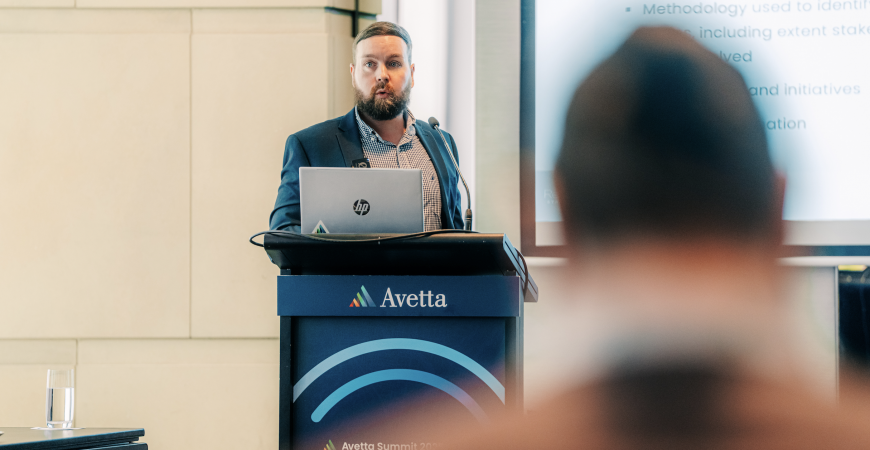When I presented at the recent Avetta Sydney Summit, it was inspiring to see so many professionals from across industries come together to talk about sustainability, safety and risk management. What stood out most was the diversity of where organisations are on their sustainability journey.
Some are leading the way embedding sustainability into their business strategy and seeing real results. Others are just beginning to come to grips with what’s expected of them, particularly with the evolving requirements under AASB S2 and growing stakeholder expectations. For some, the pace of change feels overwhelming, and there’s a sense of uncertainty about where to start.
This variation is understandable. Sustainability is a complex and rapidly evolving field. But it’s also a reminder that acting early, and moving beyond compliance, can make all the difference.
What does “beyond compliance” really mean?
Compliance remains important - it sets the foundation for responsible business. But in today’s environment, it’s also the minimum expectation. The real gains come when organisations move beyond compliance - seeing sustainability not as a checklist, but as a strategic opportunity. That means acting early to manage ESG risks, seize new opportunities, and create shared value for business, people and the planet.
It’s a shift in mindset: from “What must we do?” to “What can we do to lead and create lasting impact?” Regulators and investors are rewarding those who take this proactive approach, with greater trust and long-term performance.
Why early action matters
At ReGen Strategic, we have observed the benefits organisations realise when they move early on sustainability. The drivers for doing so are clear:
Investor and customer expectations
Stakeholders are asking for credible, consistent sustainability performance and rewarding those who can demonstrate it. In WA, companies like Wesfarmers have shown how early action builds trust and value. By embedding sustainability across its diverse businesses from reducing emissions in industrial operations to investing in circular economy initiatives at Bunnings and Officeworks, Wesfarmers has positioned itself ahead of evolving reporting standards such as AASB S2, while strengthening investor confidence.
Risk management and resilience
Understanding your material sustainability topics helps protect your business from disruptions, whether from climate impacts, supply chain pressures or changing regulations. It also helps to act on opportunities and create meaningful, positive impact. Water Corporation is a strong example: by acting early to address the impacts of climate change through investment in desalination and groundwater replenishment, it built long-term resilience to declining rainfall. This proactive approach has helped secure Western Australia’s water supply and provided a model for other utilities nationwide
Talent attraction and retention
Today’s workforce increasingly seeks employers that demonstrate genuine commitment to purpose and sustainability. Curtin University has recognised this, making sustainability a central part of its strategy and culture. Curtin’s Enabling a Sustainable Future framework helps attract and retain employees who want to contribute to positive environmental and social change.
Competitive advantage
Early movers not only meet expectations - they set them. Fortescue Metals Group (FMG) exemplifies how going beyond compliance can drive innovation and market leadership. Through Fortescue Future Industries, the company is investing heavily in renewable energy and green hydrogen, positioning itself as a global leader in the transition to a low-carbon economy. Its early, proactive stance allows it to shape policy discussions and future markets, rather than simply respond to them.
In short, taking a beyond compliance approach isn’t just about doing the right thing, it’s about doing the smart thing.
Bridging the knowledge and action gap
At the Summit, many participants were eager to understand how to take the next step - from understanding sustainability risks to integrating them into business strategy. Some were unsure how to start a materiality assessment or prepare a meaningful strategy, while others were looking for clarity on reporting and disclosure requirements.
These are common challenges, and the good news is that there’s a clear pathway forward. The key is to start by identifying what’s material i.e., the issues that matter most to your business and stakeholders. This provides the foundation for a sustainability strategy that’s practical, achievable and aligned with your core operations and stakeholder needs and expectations.
From there, regular measurement and transparent reporting turn sustainability from an aspiration into evidence-based performance. It’s about building trust, not just compliance.
The Road Ahead
As regulatory expectations evolve, the pressure to act will only increase. Businesses that start preparing now will find themselves in a stronger position to adapt, innovate and thrive.
The important thing is to begin. You don’t need to have all the answers, but you do need to take the first step. Seek advice, engage with stakeholders, and embed sustainability into decision-making early. The longer businesses wait, the harder and costlier it will become to catch up.
At Regen, we know that sustainability done well delivers shared value for the business, for people, and for the planet. Moving beyond compliance isn’t about being perfect; it’s about being proactive.
The organisations that start now will not only meet future expectations but they’ll help define them.
 ReGen Strategic
ReGen Strategic